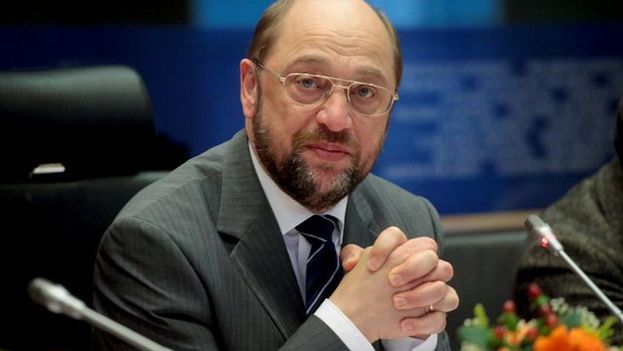
![]() 14ymedio, Madrid, 9 September 2016 – The President of the European Parliament, Martin Schulz, has shown his support of peaceful protests by the Cuban opposition to defend human rights, but is asking Guillermo Fariñas to give up his hunger and thirst strike so as to “not put your life in danger.”
14ymedio, Madrid, 9 September 2016 – The President of the European Parliament, Martin Schulz, has shown his support of peaceful protests by the Cuban opposition to defend human rights, but is asking Guillermo Fariñas to give up his hunger and thirst strike so as to “not put your life in danger.”
“Although I can assure you that peaceful initiatives to improve the political situation and human rights in Cuba have my personal support, I care about the health of Mr. Fariñas and ask him not to put his life in danger,” he says in a letter.
Schulz was responding to a letter that Berta Soler and Fariñas himself sent him on June 29 demanding that the bilateral agreement signed in March between the European Union and the Government of Cuba had human rights as a priority.
According to the president of the European Parliament, the authorities in Havana pledged to “improve the situation” during the first dialogue on human rights held on the island on June 6, but since then no changes have been observed.
“I regret the events denounced in his letters and for which he has begun another hunger and thirst strike to protest ill-treatment received and, above all, to call on the Cuban authorities to engage in dialogue with dissidents,” adds Schulz, who notes that the European Parliament is an institution concerned with human rights and stresses the importance to its members of the Sakharov Prize for Freedom of Thought, which both Fariñas and Soler have received.
Schulz says he has sent the missives of Fariñas and Soler to the relevant parliamentary committees on human rights and invites the opponents to follow up the evaluation process of the agreement.
The President of the European Parliament indicates to the dissidents that the institution may or may not consider the agreements between the European Union and third countries, a process that has not yet begun in the case of the island.
Cuba and the European Union signed an agreement on March 11 on political dialogue and cooperation that ended the old “common position” adopted in 1996 which linked dialogue with Cuba to progress on rights and freedoms.
The new policy was agreed between Havana and representatives of the European Commission, the legislative and executive body of the Union, and is awaiting the ratification of the European Council. The Parliament, chaired by Schulz, is independent of these agencies and is the only one of the highest institutions of the EU directly elected by citizens.
